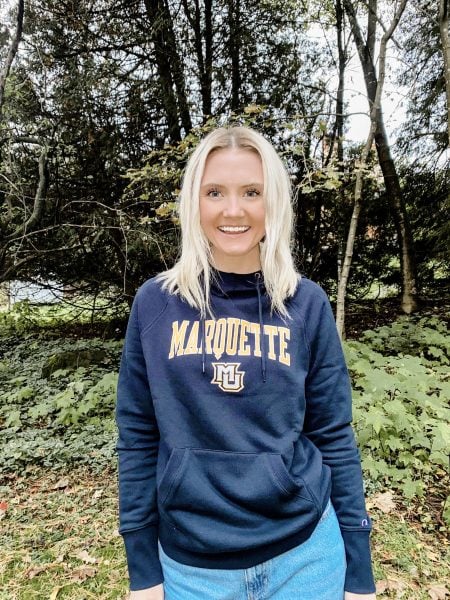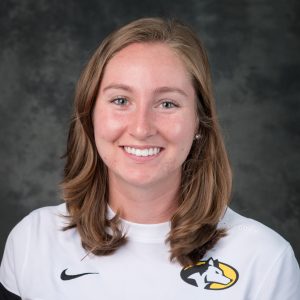We know students who choose pre-health are top-notch. They go above and beyond in everything they do. So it comes as no surprise to see them recognized for their scholarship and community service. Congratulations to our outstanding pre-health student award-winners.
Read more about pre-medical student Christian Johnson (double major in human biology and English) and pre-physician assistant student Bella Menzel-Smith (human biology major).
Click to learn more about the student experience in the pre-physician assistant program at Michigan Tech University. Learn about ways to get experience by shadowing medical professionals, volunteering in the local community (EMT, hospice, social organizations), doing undergraduate research, studying abroad, and so much more.

It’s no secret the older we get the more we need healthcare. And the U.S. is getting older. Currently, 16.5% of the U.S. population of 328 million people, or 54 million, are over the age of 65, according to the latest census. By 2030, that number will rise to 74 million, a 37% increase. And the number of people over the age of 85, who generally need the most care, is growing even faster.
So it comes as no surprise that healthcare is expected to create jobs at a faster clip than the rest of the economy. The Bureau of Labor Statistics estimates 16% growth across all healthcare professions. And these professions pay very well, too. The table below lists just some examples.
| Occupation |
Projected Job Growth |
Median Pay |
| Audiologists | 16% | $81,030 |
| Chiropractors | 11% | $70,720 |
| Dentists | 8% | $164,010 |
| Optometrists | 9% | $118,050 |
| Occupational Therapists | 17% | $86,280 |
| Physical Therapists | 21% | $91,010 |
| Physicians Assistants | 31% | $115,390 |
| Podiatrists | 2% | $134,300 |
| Speech Pathologists | 29% | $80,480 |
| Veterinarians | 17% | $99,250 |
Michigan Tech’s Pre-Health professions minor has been preparing tomorrow’s healthcare leaders and helping to fill the growing demand for healthcare professionals. Pre-Health professions features helpful faculty and staff ensuring students: meet academic requirements for professional programs, receive valuable clinical experience and successfully navigate the application process. All of which results in a 70% acceptance rate into all health professional programs. For Tech students applying to medical school, they have a 65% acceptance rate (approximately twenty-five percentage points above the national average).
Students can pair this minor with any degree/major they choose at Tech. Popular pairings are made with Human Biology, Medical Lab Science, Biomedical Engineering, Exercise Science, Chemistry, and Psychology. While students can choose any major, these are the most common!
But don’t let us tell you. Hear from our students first-hand how they prepared for the health professional program of their choice.
Listen to Jill Poliskey describe how a study abroad program in Ireland helped her decide to change her focus and her major and decide to go to medical school to become a doctor.
Listen to Abigail Botz describe how getting involved in research on campus and working as a peer health advocate has helped to strengthen her application.
Emma DeBaeke shares her journey from Tech into into Physcial Therapy school.
And Karmyn Polakowski talk about her entrance into med school thanks to Michigan Tech’s Early Assurance Program (EAP) with Michigan State University.
Learn more about Pre-Health at Michigan Tech or contact Nicole Seigneurie, Director, Pre-Health Profession directly at 906.487.2850 or nmseigne@mtu.edu.

My name is Bella Menzel-Smith, and I am currently a fourth-year student at Michigan Technological University.
I will be graduating this May from MTU with a degree in Human Biology. After graduation, I will be attending Marquette University’s Physician Assistant Program. As a Pre-Physician Assistant student at MTU, I was able to take courses in biology, chemistry, psychology, public health, and epidemiology. My favorite aspect of MTU’s Pre-Health program has been the supportive faculty. I truly have felt that I have been a part of a tight-knit community throughout the past four years. Working with the Pre-Health advisor, Nicole Seigneurie, was so beneficial to me because she was always there to answer my questions and cheer me on along the way. In addition to this, all my professors have been more than helpful to make sure that I succeeded in their classes.
When I was unsure about what I wanted to study during my first year of college, I had an annual healthcare check-up with my healthcare provider who is a Physician Assistant. I asked her questions about her profession, and she had nothing but positive things to say. I decided to do more research on my own, and I found out that the Physician Assistant profession was created in 1965 by Dr. Eugene Stead, in order to address healthcare disparities and the need for more primary care providers. Immediately, I was so excited that I had found a healthcare profession that was created for the exact reasons as to why I wanted to enter the healthcare field! Growing up in a rural area, I have seen firsthand how poverty and access can affect the quality of healthcare that people receive. When people in my community need to see a specialist, they have to travel at least four hours away. Therefore, it is my goal as a Physician Assistant to be a healthcare advocate for marginalized populations and to improve healthcare disparities in rural medically underserved areas.
Once I decided that I wanted to pursue the Physician Assistant profession, I knew that I had to get involved in the MTU community. I have been a tutor at the Chemistry Learning Center, since my second year at Tech. Being a tutor has allowed me to support students during their difficult chemistry classes. I have loved being able to help students build their confidence and strengthen their studying skills. I have also been a Co-President of Student Well-being Advocates at MTU and the President of AED Pre-Health Honor Society for the last year. Both of these opportunities have allowed me to work on my leadership and communication skills. Through Student Well-being Advocates, I was able to start a Winter Warm-Up winter accessory drive that takes place annually on campus. In addition to my involvement on campus, I was fortunate enough to be a Crisis Text Line Counselor where I learned how to be an empathetic listener to people who were in crisis. I know that the lessons I’ve learned throughout this experience will help me with my future interactions with patients. I believe that it’s so important for everyone to get involved with extracurricular activities that you enjoy to help you find your passions in life!
The most valuable advice that I have for anyone who is on a Pre-Physician Assistant pathway is to gain clinical experience. I was a Certified Nursing Assistant for over a year at a local nursing home. Through this experience, I was able to learn how to provide person-centered compassionate care to my residents. I cared for individuals who had a diagnosis of dementia, and I learned the importance of treating my residents as the human beings that they were and not as their diagnosis. I also found that one of my professional callings in life is to be a healthcare advocate for vulnerable populations like the elderly. I know that this experience has taught me so much and will be very beneficial to my future as a Physician Assistant. I hope everyone takes advantage of their time at Tech and gets involved in the community as much as possible. I will forever be grateful for the time that I have spent at MTU!
 A moment that I thought about for many years had finally come.
A moment that I thought about for many years had finally come.
I could not put into words the joy and excitement I felt when I saw the acceptance email from the director of the Physician Assistant (PA) Program at Central Michigan University (CMU).
My journey to becoming a PA began in high school. I was eager to obtain my certified nursing assistant (CNA) license so that I could begin to immerse myself in the medical field and learn new skills that would help prepare me to become a PA in the future. For the last four years, I have worked as a CNA in multiple health-care settings and volunteered in the community, while pursuing an undergraduate degree in biological sciences. I believe that my varying health care experiences allowed me to develop as a person, and my confidence has grown significantly.
I learned more about the day-to-day routine of a physician assistant once I began shadowing multiple PAs in different specialties. I would encourage anyone pursuing a PA career to begin shadowing as soon as possible! Shadowing is a great way to start forming relationships with mentors in the field that can help you throughout the application process, and to see what qualities are desired in the profession.
“As you prepare yourself for a career in medicine, focus on meaningful experiences that challenge you as a person and future medical professional”
Leadership is an instrumental quality PA programs look for in prospective candidates, not only within a health-care setting but in extracurricular activities. I had the opportunity to be a part of the Michigan Tech Women’s Varsity soccer team for four years. Balancing academia and athletics as an undergraduate provided me with invaluable time management and leadership skills that I take with me as I pursue graduate school and my PA career.
Take the initiative to seek out your own opportunities and begin to network with physician assistants early on. Thoroughly look into the programs that you intend to apply to. Each program emphasizes different prerequisite courses, GRE test scores, and number of health-care and shadowing hours needed. It’s important to plan ahead, but don’t get discouraged by the numbers! Be confident in yourself. Getting into a PA program is not a race; if you need to take extra time finishing up prerequisite courses or experiencing more patient care, that is OK.
Throughout the application process, I was drawn toward the emphasis the CMU PA program places on addressing the medical needs of underserved and rural populations. The program immediately felt like the perfect fit for me when I visited the campus, interacted with faculty, and talked with current students. In just a couple months, I am excited to continue my journey, joining CMU’s PA class of 2020!